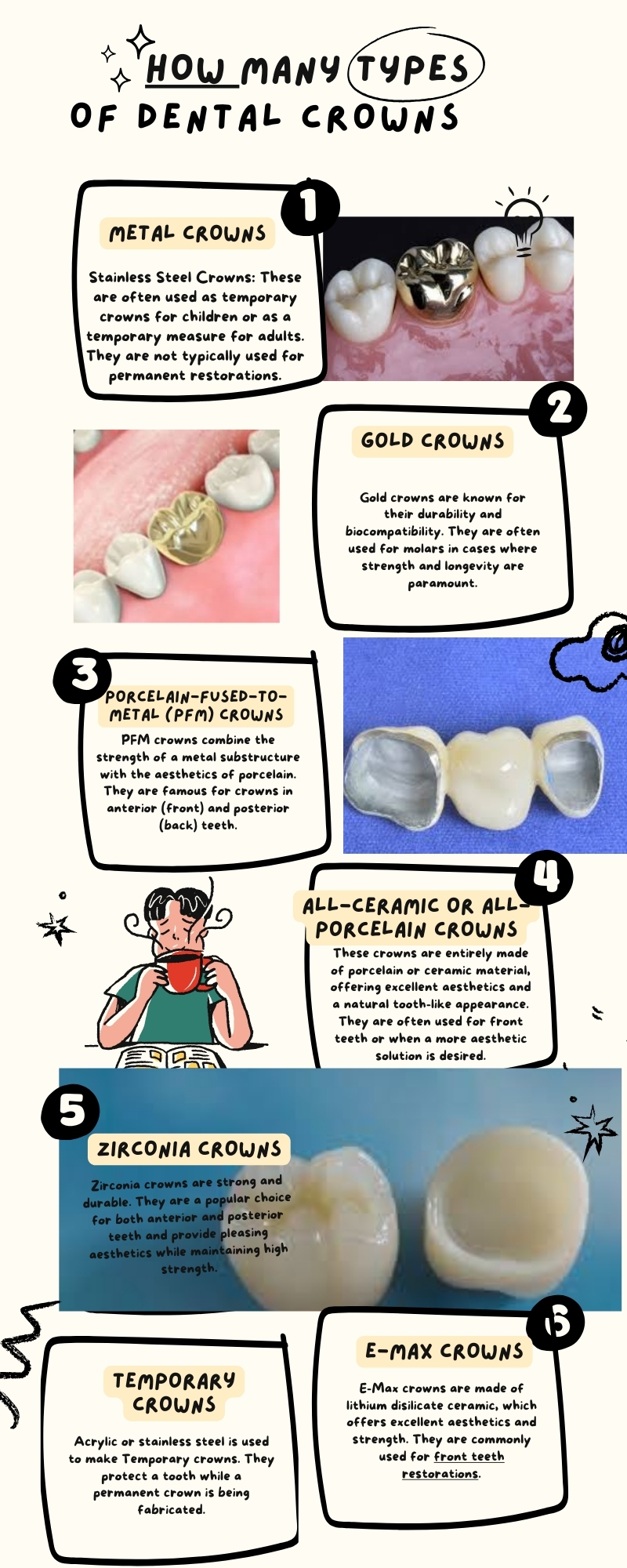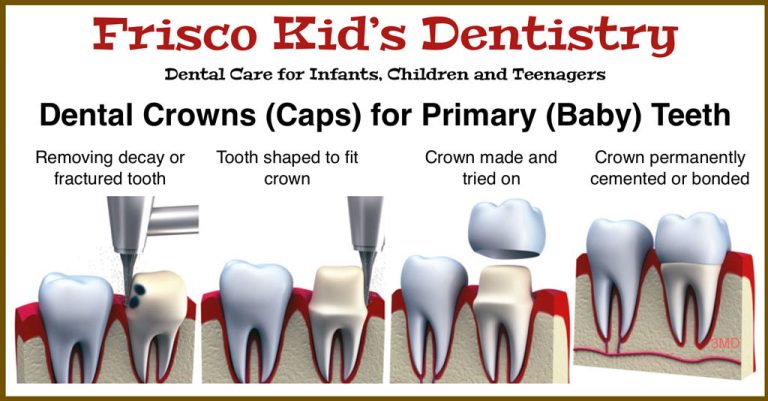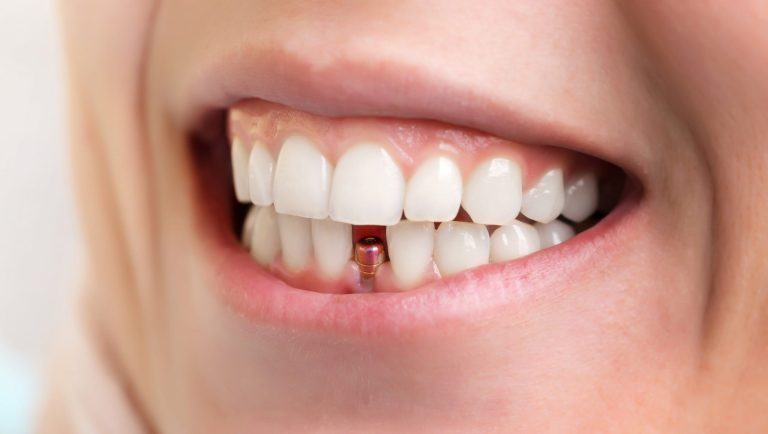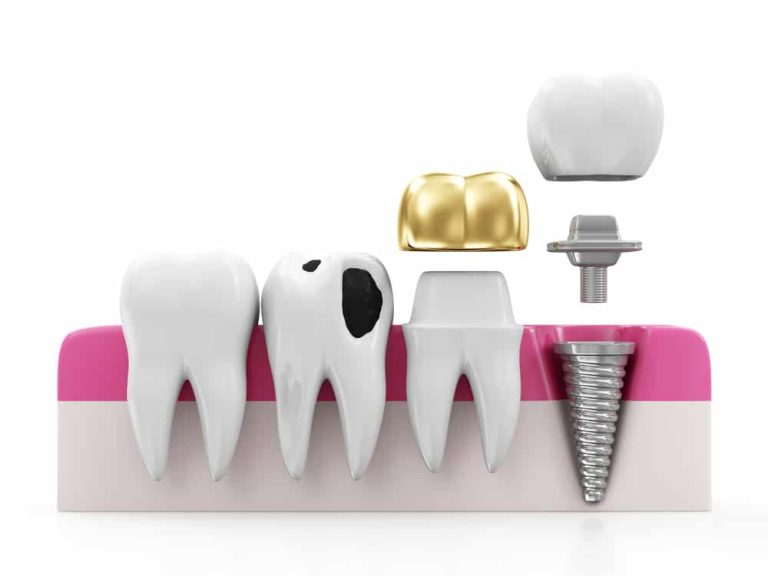Types of Dental Crowns
Last Updated on 4 months by DR. ALBIN SIPES
There are many types of dental crowns available on the market today. Each type of crown has its advantages and disadvantages. The type of dental crown that is right for you will depend on your individual needs and preferences.
Here we discuss them:
1. Porcelain-fused-to-metal (PFM) dental crowns are made from a metal core covered with porcelain. These crowns are strong and durable. It can match the color of your natural teeth.
However, the metal core often shows through the porcelain, giving the crown a dark or yellowish appearance.
2. All-ceramic or all-porcelain dental crowns are made entirely from ceramic materials. These crowns are very natural-looking, and they do not contain any metal components.
However, all-ceramic crowns are not as strong as PFM or metal-crowned teeth, and they may chip or break more quickly than other dental crowns.
A dental crown supports a large filling when insufficient tooth remains and protects a tooth from fracture or decay. Several types of dental crowns are available, each with their advantages.
The most common type of dental crown is the metal crown. Metal crowns are made from gold alloy, palladium alloy, or base metal alloys such as cobalt-chromium. Metal crowns are strong and durable. It’s best for restoring molar teeth.
However, they are also the most visible type of crown and can sometimes cause an allergic reaction in some people. Porcelain-fused-to-metal (PFM) dental crowns offer the strength of metal with the esthetics of porcelain. PFM crowns are made by fusing porcelain to a metal substrate such as gold alloy or palladium alloy.
They are less visible than metal crowns and provide good resistance to wear; however, they can chip and break more easily than all-ceramic Crowns. All ceramic dental Crown types include zirconia and alumina materials. These ceramic systems provide superior esthetics to PFM Crown but may not be suitable for every clinical situation.
All ceramic systems offer excellent biocompatibility and great strength for posterior teeth. In addition, these materials do not require a metallic inner core, which means they can be used in patients who have allergies to metals. Zirconia is one type of all-ceramic system used extensively in recent years due to its high strength.
What Type of Dental Crown is Best?
Each type of dental crown has its benefits and drawbacks, so it’s essential to consult with your dentist to see which would be best for you. Here is a brief overview of the different types of dental crowns:
Porcelain Dental Crowns: They are made entirely of porcelain, making them very natural-looking. They are also solid and durable, ideal for people with previous tooth damage or who grind their teeth at night. However, they can be more expensive than other types of dental crowns, and they can also chip and break more easily.
Gold Dental Crowns: Gold dental crowns are made of gold alloy and are often used for people with back teeth that need to be crowned. They are solid and durable, but they can also be quite expensive. In addition, gold crowns can sometimes cause allergic reactions in some people.
Stainless Steel Dental Crowns: Stainless steel dental crowns are typically only used on baby or primary teeth that permanent teeth will eventually replace. It’s less expensive than other dental crowns. Stainless steel crowns can also discolor over time, so they may not be the best choice if you’re looking for a natural look.
How Many Types of Dental Crowns Are There?
There are many different types of dental crowns available on the market today. Here we make a list :
- Metal Crowns: Stainless Steel Crowns: These are often used as temporary crowns for children or as a temporary measure for adults. They are not typically used for permanent restorations.
- Gold Crowns: Gold crowns are known for their durability and biocompatibility. They are often used for molars in cases where strength and longevity are paramount.
- Porcelain-Fused-to-Metal (PFM) Crowns: PFM crowns combine the strength of a metal substructure with the aesthetics of porcelain. They are famous for crowns in anterior (front) and posterior (back) teeth.
- All-Ceramic or All-Porcelain Crowns: These crowns are entirely made of porcelain or ceramic material, offering excellent aesthetics and a natural tooth-like appearance. They are often used for front teeth or when a more aesthetic solution is desired.
- Zirconia Crowns: Zirconia crowns are strong and durable. They are a popular choice for both anterior and posterior teeth and provide pleasing aesthetics while maintaining high strength.
- E-Max Crowns: E-Max crowns are made of lithium disilicate ceramic, which offers excellent aesthetics and strength. They are commonly used for front teeth restorations.
- Porcelain Crowns with Metal-Free Options: These crowns are made from metal-free materials like lithium disilicate, zirconia, or other ceramics to provide strength and a natural appearance without any metal substructure.
- Temporary Crowns: Acrylic or stainless steel is used to make Temporary crowns. They protect a tooth while a permanent crown is being fabricated.
- Resin Crowns: Resin crowns are often used for temporary or short-term restorations due to their lower durability than other materials.

What Type of Crown Lasts the Longest?
Concerning crowns, there are three main types: all-porcelain, porcelain-fused-to-metal, and all-metal. So, which kind of crown lasts the longest? The answer may surprise you.
All-porcelain crowns have the shortest lifespan of the three types. On average, they last between 5 and 7 years. Porcelain-fused-to-metal crowns fare slightly better, lasting ten years or more.
But the clear winner is the all-metal crown; with proper care, these babies can last a lifetime! Of course, many factors can impact the longevity of any height. Your oral hygiene habits, for example, play a significant role in how long your crown will last.
If you have any underlying dental problems (like tooth decay), that can also shorten the lifespan of your crown. Bottom line: If you want a crown that will last many years, go with an all-metal option. Just be sure to take good care of it (and your teeth)!
DENTAL CROWN TYPES. Zirconia, Emax, PFZ, PFM, Metal!! Choosing the BEST!
Types of Dental Crowns And Cost
Dental crowns are usually made from porcelain, metal, or both.
Porcelain crowns are generally more expensive than metal crowns, but they offer a more natural-looking option. Metal crowns are typically made from gold, palladium, or chromium alloys. These alloys provide a solid and durable opportunity but can also be quite noticeable in the mouth.
We collect a list of rough estimates of the relative cost ranges for different types of dental crowns:
| Dental Crown Type | Approximate Cost Range |
|---|---|
| Stainless Steel (Temporary) | $100 – $300 per crown |
| Gold | $800 – $2,500 per crown |
| Porcelain-Fused-to-Metal (PFM) | $800 – $1,500 per crown |
| All-Ceramic/All-Porcelain | $800 – $2,500 per crown |
| Zirconia | $900 – $2,500 per crown |
| E-Max (Lithium Disilicate) | $900 – $2,500 per crown |
Please note that these are approximate cost ranges and your actual cost can vary significantly based on factors such as the dentist’s experience. The location of the dental practice, the case’s complexity, and whether you have dental insurance coverage.
Disadvantages of Dental Crowns
A few disadvantages of dental crowns First, they can be more expensive than other dental treatments. Second, they require more time and effort and can take longer to heal.
Finally, the crown could come loose or fall out entirely. But this is not for everyone. If the crown is loose or falls out entirely contact your dentist urgently. Remember a crown is not made by the dentist. There are crown technicians to create them.
Low-Cost Dental Crowns
Most people need to be aware that low-cost dental crowns are available.
However, there are now many options for low-cost dental crowns that can save you a lot of money. One option for low-cost dental crowns is to get them made from composite materials. Composite material is much less expensive than porcelain or ceramic and looks just as good.
You can also get your dentist to use a less expensive type of porcelain or ceramic for your dental crowns. This will still look great and protect your teeth, but it will cost you less money. Another way to get low-cost dental crowns is to go to a discount dentist.
Discount dentists offer the same services as regular dentists but charge much less. You can often find discount dentists online or in the Yellow Pages. Just make sure that you check out their credentials before making an appointment.
If you need a dental crown but need more money, consider getting one made from composite material or going to a discount dentist.
Dangers of Dental Crowns
While dental crowns are considered safe, there are some risks associated with them.
The most common complication associated with dental crowns is chipping or cracking of the crown. Porcelain crowns are particularly susceptible to this type of damage. Crowns can also become loose, allowing bacteria to enter the tooth and cause decay.
Sometimes, an allergic reaction to the materials used in the crown can occur. If you are considering getting a dental crown, discuss the potential risks and complications with your dentist beforehand.
Tooth Cap Vs Crown
Your dentist will work with you to determine the best material for your needs. A tooth cap is similar to a dental crown in that it covers the visible portion of your tooth above the gum line. However, a tooth cap only covers the front surface of your tooth, while a dental crown encases the entire tooth.
Tooth caps are typically made from porcelain or composite resin and are less expensive than dental crowns.
Conclusion
The type of dental crown that is right for you will depend on the condition of your teeth, the location of the tooth, and your budget. Porcelain dental crowns are one type of dental crown that is made from porcelain material.
They are often used to cover up discolored or misshapen teeth. Another type of dental crown is called a ceramic dental crown. These crowns are made from a combination of porcelain and ceramic materials.
They are less expensive than porcelain crowns. Metal dental crowns are another option for restoring your smile. They are made from gold, silver, or other metals and can last many years with proper care.



